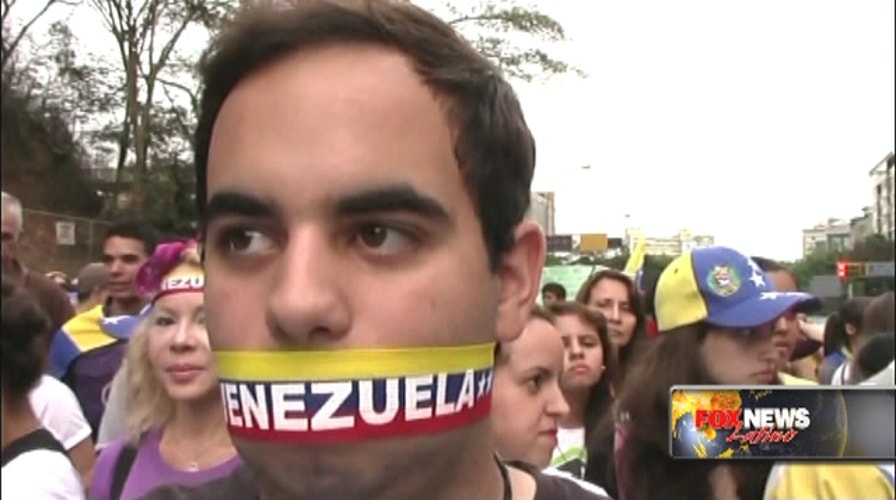Latino year in review
2014 was the year Latinos finally saw change in U.S. immigration policies, but it was also the year they said goodbye to some of their biggest cultural icons.
2014 was a year that will be long remembered. From the ground-breaking – and controversial – U.S.-Cuba deal to executive action on immigration, issues that impacted Latinos dominated the headlines.
And while Hispanics finally saw long-hoped-for changes in U.S. policies, it was also the year that the community said good-bye to some of its biggest and most influential icons.
Here are the year’s highlights, month by month.
January
The year starts with farmers in Mexico standing up to cartel violence. Dozens die in the bloodshed, and the government is forced to send in the military to restore order.
February
In a major win for the war on drugs, Mexican officials announce the capture of the world’s most wanted and ruthless criminals, Joaquín “El Chapo” Guzmán. Known as Mexico's Osama bin Laden, Guzman is the world's most powerful and elusive drug lord before he is arrested in a high-rise beachfront condominium in Mazatlán, Mexico. Guzmán's capture ends a long manhunt that lasted over a decade.
A peaceful student protest in Venezuela turns violent and sparks a nationwide anti-government movement. More than 40 people are killed and hundreds hurt after thousands pour into Caracas to protest the lack of basic goods, security and free speech.
March
Mexican director Alfonso Cuarón becomes the first Latino filmmaker to win the Oscar for Best Director for his 3-D space thriller, “Gravity.”
April
Gabriel García Márquez, the Nobel laureate whose novels and short stories exposed tens of millions of readers to Latin America's passion, superstition, violence and inequality, dies. Widely considered the most influential Spanish-language writer since Miguel de Cervantes, García Márquez achieved literary celebrity that spawned comparisons to Mark Twain and Charles Dickens.
May
Homeland Security says more than 45,000 unaccompanied minors crossed the U.S.-Mexican border illegally, prompting the Obama administration to open detention centers and increase funding to border states to help with the crisis.
June
After 39 years at the throne, Spain’s King Juan Carlos abdicates. His son, Felipe, 46, takes over.
The eyes of the world turn to Brazil for the 2014 World Cup, the most expensive in history. The price tag, more than $11 billion, causes widespread anger and protests. But it doesn’t stop the games – Germany takes home the coveted golden statue.
July
The World Cup helps crown pop singer Shakira the queen of social media. After sharing a picture of herself at a match, the Colombian singer becomes the first person in the world to surpass more than 100 million “likes” on Facebook.
September
Corrupt police officers allegedly attack a group of students on their way to a protest in Mexico. Six people are killed, 25 others are hurt and 43 disappear. They are presumed dead.
The case of the “missing 43” sparks worldwide protests and condemnation against the government of President Enrique Peña Nieto. The arrest of dozens of police officers and local government officials does not temper anger and the demonstrations continue for the rest of the year.
October
Fashion designer Oscar de la Renta dies of cancer at the age of 82. Born in the Dominican Republic, the designer dressed countless celebrities and first ladies.
De la Renta became a household name in the fashion world in the 1960s as one of the couturiers to dress first lady Jacqueline Kennedy. He went on to dress other first ladies like Nancy Reagan, Hillary Clinton, Laura Bush and, most recently, Michelle Obama, as well as some of the most famous women in Hollywood including Sarah Jessica Parker, Penelope Cruz, Sandra Bullock and Anne Hathaway.
The Hispanic community also mourns the loss of Cuban-American actress Elizabeth Peña, whose career spanned four decades and included roles in films like “La Bamba” and the popular TV show “Modern Family.”
November
President Obama uses executive action to extend protection from deportation to some 5 million undocumented immigrants. The move angers Republicans who say the president has no legal authority to bypass Congress.
Latin America’s biggest comic – Roberto Gomez Bolaños, better known as “Chespirito” – dies of heart failure in Mexico. He became a cultural icon across the world after starring in hit TV shows like “El Chavo del Ocho” and “El Chapulín Colorado.”
The political world mourned the loss of Herman Badillo, the first Puerto Rican-born person elected to the U.S. Congress.
December
The United States and Cuba agreed to establish diplomatic relations and open economic and travel ties, marking the most significant shift in U.S. policy toward the communist island in more than 50 years. The announcement came amid a series of new confidence-building measures between the longtime foes, including the release of American contractor Alan Gross, as well as a swap for a U.S. intelligence agent held in Cuba and the freeing of three Cubans jailed in the U.S.

